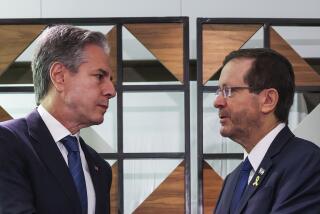Palestinian rivals Hamas and Fatah reach a preliminary deal on governing Gaza
Reporting from Jerusalem — Amid fanfare and embraces, representatives of the rival Palestinian factions Fatah and Hamas, after a decade at loggerheads, signed a preliminary agreement Thursday to reunify and share control and leadership of the Gaza Strip.
The images of an exuberant Salah Aruri, deputy head of Hamas, and senior Fatah leader Azzam Ahmad rejoicing at the headquarters of the Egyptian intelligence agency in Cairo provided a stark contrast to images of the bloody civil war that tore a shaky Palestinian unity government apart 10 years ago.
This is the fourth time since the original Palestinian unity government fell apart in 2007 that Hamas and Fatah have announced a reunification. The last time they met in Cairo, in 2011, a unity agreement was ceremonially announced only to immediately collapse.
The stakes are higher now because the deal could ease dire humanitarian conditions in the Gaza Strip and pave the way for further talks, but it does not address significant issues — such as the future of Hamas’ armed militia — that have stymied earlier attempts at a union.
In an attempt to leverage its power against Hamas, Fatah in recent months imposed severe sanctions that have included halting the payment of salaries to government officials in Gaza and reducing electrical power to only four hours a day. These measures are expected to be immediately revoked.
On Wednesday, Hamas leader Ismail Haniyeh said that this time, “we’ll go to any length to implement the agreement and turn over a new leaf in the annals of our people, forever closing the book on our divisions.”
Palestinian Authority President Mahmoud Abbas said the accord was a “final agreement to end division,” and his office guardedly announced that, for the first time in 10 years, Abbas would visit Gaza in the coming month.
Fatah, which is recognized by the United States and Europe and which has represented the Palestinians in peace talks with Israel, and Hamas, an Islamist militia that the U.S., Europe and Israel classify as a terror organization, have not worked together since the split, when Hamas forcibly took power in the Gaza Strip after contested elections.
In announcing the deal it brokered, the Egyptian government said that Fatah would take over all government authority in Gaza by Dec. 1, including the all-important supervision of Gaza’s borders with Egypt and Israel, which have been all but sealed for the past decade, leaving 2 million people living under siege.
A statement released by Israeli Prime Minister Benjamin Netanyahu’s office said, “Israel will monitor developments in the field and act accordingly.”
“Any reconciliation between the Palestinian Authority and Hamas must be in compliance with international agreements, with the Quartet’s conditions, and first and foremost must include recognition of Israel and the disarming of Hamas,” it read. The Quartet is composed of the United States, the European Union, the United Nations and Russia, who together have mediated the Israeli-Palestinian peace process.
“Ongoing tunnel digging, manufacture of missiles and the launch of terror attacks against Israel do not conform to the Quartet’s conditions and to American efforts to renew the peace process,” the statement said.
As darkness fell Thursday, Gazans took to the streets to rejoice. But the specter of Hamas’ heavily armed militia of 25,000 men coexisting with the 3,000 members of Abbas’ presidential guard who, according to the agreement, will be sent to Gaza to protect the borders, is hard to vanquish.
Veteran Palestinian legislator Mustafa Barghouti, who leads the centrist Palestinian National Initiative, said in an interview that, while the deal represents “a necessary entry point without which the Palestinian people could not move forward, the most important issues remain.”
The coming month, he said, “will be the most important test” of the two factions’ ability to govern together, as they devise procedures for the new coalition, set a date and conditions for long-postponed Palestinian national elections, and come to an agreement on “internal security matters.”
Precisely countering Israel’s demands — and until now, the conditions set by Abbas, who has said he will not accept Hamas as a separate militia such as Lebanon’s Hezbollah — Barghouti said that “disarming Hamas is not on the table. It has not been on the table, and it will not be on the table until the end of occupation and it is discussed as part of security in final status negotiations with Israel.”
Regarding Hamas’ status as a terror organization, Barghouti said, “It is up to them to think what they want. Hamas is part of the Palestinian people and is obviously a party to this deal.” He expressed hope that their representation in the Palestinian government “will not create any serious resistance from the international community.”
Majdi Khaldi, Abbas’ diplomatic advisor, preferred to describe the situation in softer terms.
Abbas remains committed to leading a unified Palestinian government, he said, using Abbas’ much-used formula of “one government, one law, one gun.”
“President Abbas’ demand is to have one gun under the government. This is what we are aiming for and Egypt is facilitating, and we’ll see what will come in the future,” he said.
“The demand will never be withdrawn, but we are not here to disarm anyone. We are here to control all aspects of life in Gaza, and this includes arms, the law, a full takeover. It will be the same as in the West Bank,” where the Palestinian government rules.
Times special correspondent Tarnopolsky reported from Jerusalem and special correspondent Omar Medhat contributed from Cairo.
UPDATES:
11:45 a.m.: This article was updated throughout with staff reporting.
This article was originally published at 4:25 a.m.
More to Read
Sign up for Essential California
The most important California stories and recommendations in your inbox every morning.
You may occasionally receive promotional content from the Los Angeles Times.










